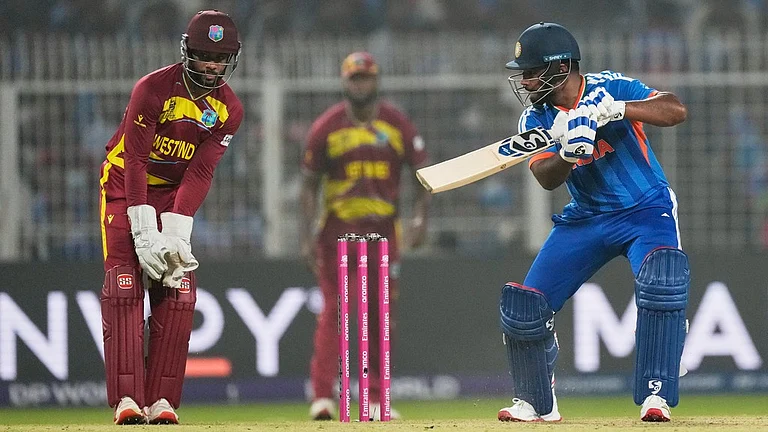I just got off the phone with Minara, a 22-year-old refugee woman from Myanmar who lives in South-East Delhi. After being admitted to the Department of Psychiatry in Safdarjung Hospital for one month, she has recently returned home to her hut made of plastic sheets, mud and bamboo; currently semi-submerged in water because of the incessant rains. Her hospital discharge summary, a copy of which she sent to me on WhatsApp, reads, “severe depressive disorder” and the advice on it in bold letters states—“never leave the patient alone with sharp objects in the vicinity”.
Over the phone, Minara cries out, “The conditions in the refugee settlement here haunt me. Some days there are fires, other days it’s flooding. These life-threatening situations remind me of the violence I fled. In those moments I want to kill myself.” Minara is currently six-months pregnant and also has a three-year-old child.
Minara Begum’s case may sound extreme but it is reflective of what many refugee women globally face. Displaced women fleeing for safety are already scarred by violence, conflict and loss. As they enter their host countries, a volley of biases targeted at them pushes them over the edge. For women refugees, these biases are intersectional; they emerge from their multiple identities—being displaced, gender, ethnicity, race, religion, nationality, and sexuality. All of this together has a multiplied detrimental impact on them. High rates of post-traumatic stress disorder (PTSD) have been found among refugees, with women having the highest incidence, according to a recent study published by the National Institutes of Health (NIH), a US-based medical research agency.
The deterioration of mental health in women refugees directly correlates to the violence and abuse, both physical and sexual, that they experienced in their home countries and along the migration route. In most cases, it is exacerbated by the lack of social support and the apathy of the host country towards them.
“I was raped by the smuggler who transported me and other refugees to the European border,” said Daria, an Iranian refugee woman, as we spoke at a safe space workshop that I was conducting in the Aegean island of Lesvos. “I was also raped by the Turkish police in the prison, when they apprehended us.” Daria, a single woman, had journeyed alone from Iran to Greece. “That was not it”, she said. “I thought I’d be safe at the refugee camp but once again, I was sexually assaulted when going to the toilet at night.”

Within a span of 90 days, Daria was sexually assaulted thrice. According to the UNHCR, one in five women refugees experiences sexual violence but many are fearful to complain about a sexual assault or crime in their host country, fearing identification and deportation. They choose to suffer in silence rather than draw attention to their existence. “Being a woman is hard. But being a refugee woman is harder than anything else,” said Daria.
The lack of assistance to women refugees by host nations when it comes to mental health support, protection from violence, and providing sustainable opportunities is in stark contradiction to the guidelines of The Global Compact on Refugees. Point 74-75 of this international framework notes that “States and relevant stakeholders will seek to adopt and implement policies and programmes to empower women and girls in refugee and host communities, and to promote the full enjoyment of their human rights, as well as equality of access to services and opportunities.” This framework was affirmed by 181 countries, including India, in December 2018.
However, many host countries provide only limited access to basic human rights and protection to refugee women and girls. Many times, the host state itself creates barriers to access education, livelihood and healthcare, thereby pushing displaced women and girls into extremely vulnerable and at-risk situations.
In India, the absence of a national law makes it easy for the authorities to treat different refugee populations differently and be discriminatory against some. As per the UNHCR, 46,000 refugees and asylum-seekers are registered with UNHCR India. A majority of them are Rohingya and Chin refugees from Myanmar. The refugees from Myanmar are prohibited from possessing a government identity card like Aadhaar. This further limits them from accessing higher education or livelihood opportunities, making women and girls all the more vulnerable.
Minara had ambitions of becoming a social worker and was studying in the tenth grade. But she wasn’t allowed to appear for her final exams as she was “a refugee” and did not possess a government identity card. With no prospects of higher education, Minara’s family decided to get her married. Restrictions to higher education, combined with the gender prejudices ingrained both in the refugee and host community, push refugee girls into child marriages, making them susceptible to intimate-partner violence and trafficking.
Women and girls make up around 50 per cent of any refugee population globally. Many of them are single mothers fleeing with their children and seeking safety. As part of my global work with refugee women, I asked the same question to 25 refugee mothers in camps and settlements—“What do you want from the host country where you live now?” I asked this to refugee mothers from Ukraine, Afghanistan, Syria, Iraq, Iran and Palestine.
Each time the response was—“a safe and better life for my children.” Mothers often flee only when they realise that their child’s life is at risk. They take the most perilous journeys, many times by themselves, to get to safety. Unfortunately, host nation policies and laws are always not favourable to them. At the borders, refugee women face the risk of detention and prolonged separation from their child. Those who make it through the border safely struggle to make ends meet.
Olha, a single Ukrainian mom, says that she would have stayed back in Ukraine to fight the Russian invasion but it was for the safety of her four-year-old son that she decided to flee to Poland. Even though European countries were welcoming Ukrainian refugees, Olha still had a hard time. “I worked at a bank in Ukraine and have a Master’s degree but none of that is of any use here. I can’t get a job because I don’t speak the local language.”
To make ends meet and find housing for her and her son, Olha was forced to clean houses. Far from where Olha lives and across the Atlantic, Cynthia, a Chin refugee from Myanmar, is facing similar challenges. A single mother to three minor children, Cynthia lives in New Delhi but has no source of income. Despite being a postgraduate and having several years of experience as a social worker, no organisation in Delhi can hire her since she doesn’t own an Aadhaar card. “My children and I are surviving on my savings but it won’t last forever,” says Cynthia.
Some refugee mothers also face the trauma of separation from their children. Horrifying stories of detention and separation of children from mothers have occurred at border crossings. Most of these stories that we have heard are from the US-Mexico border but this draconian practice is not limited just to the West. Closer home, refugees coming from Myanmar are often arbitrarily detained and separated from their children at the India-Myanmar and the India-Bangladesh border. “My mother was separated from all of us and kept in Kolkata’s Dum Dum jail for two years,” said a Rohingya refugee child to me, requesting anonymity. “My siblings and I were separated as well and sent to different shelter homes. I never got to see my mother for two years.” It took two years, but fortunately, this family was reunited. Unfortunately, many refugee mothers still remain in detention, separated from their children. Experts say that more than 500 refugees are in unlawful and indefinite detention in India. The majority of them are women and children.
For a population that is one of the most vulnerable given the many intersectional biases they face; host countries should adopt policies that welcome and support refugee women and girls. Replacing detention and threats of deportation with access to education and livelihoods can make refugee women and girls an asset to the host communities and countries.
(Some names changed to protect identities. Views expressed are personal)
(This appeared in the print as 'A Safe Haven')
Priyali Sur is the founder and executive director of the Azadi Project that works for women from marginalised and refugee communities























